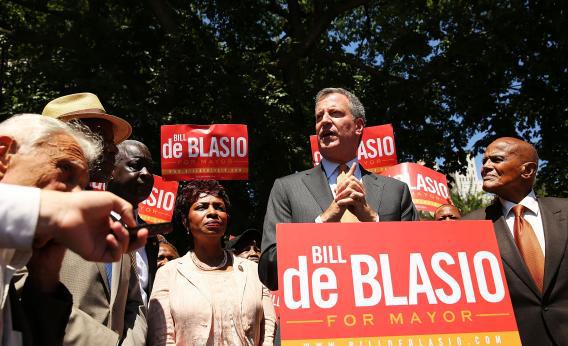Henry Goldman and Max Abelson ask very rich New Yorkers how they feel about Bill de Blasio’s plan to raise taxes on high-income New Yorkers and find that he’s hurt the feelings of the city’s financial elites:
“It shows lack of sensitivity to the city’s biggest revenue providers and job creators,” said Kathryn Wylde, president of the Partnership for New York City, a network of 200 chief executive officers, including co-Chairman Laurence Fink of BlackRock Inc. (BLK), the world’s biggest money manager. […]
“Almost anyone with a self-perceived degree of affluence will be uncomfortable with de Blasio’s tax ideas,” said Michael Steinhardt, chairman of New York-based asset manager WisdomTree Investments Inc. While growing inequality is troubling, Steinhardt said, “perhaps even more so is the thought that more government spending is the way out of our problems.” […]
Former Citigroup Inc. Chairman Richard Parsons said that he’d “gladly pay higher income taxes if all of the increase went to fund early education.” At the same time, Parsons said, he harbors doubts about de Blasio’s appreciation of “the importance of the business community and more significantly, what it will take to keep business thriving.”
Wylde delivered the money quote here, but I think it’s Richard Parsons whose remarks best capture the spirit of the times. De Blasio’s tax plan would raise marginal rates on anyone earning more than $500,000 a year. But Goldman and Abelson are talking to people with incomes far higher than that, people who would never with a straight face say that the problem with raising their taxes is that if they had to pay higher taxes then they would have less money. They need to process this as a different complaint. As the idea that—as Richard Parsons says—a proposal for higher taxes is a signifier that a politician doesn’t respect the role of private industry in making a city (or state or nation) thrive.
And here’s the thing: I think this whining is only partially disingenuous. If you think about Maslow’s hierarchy of needs, these guys are well past any real need for increased consumption. In terms of status goods, they’re mostly competing against each other. But everyone wants respect. The financial services industry is the economic basis for 21st-century New York City, and its titans like the idea of a mayor—a mayor like Michael Bloomberg—who values high finance on its own terms rather than someone who is simply looking for additional ways to capture finance-related income streams for civic purposes.
But the flipside of this is that in a lot of ways I think rich businessmen would be happier if we could go back to 1950s-style, more egalitarian distribution of pre-tax income. The richest people around would still be the richest people around, and as the richest people around they would live in the nicest houses and drive the nicest cars and send their kids to the best schools and in other respects capture the vast majority of the concrete gains of being rich. But they’d also have a much better chance of gaining the kind of respect as civic and national leaders that they crave. They want to be seen as the “job creators” and the heroes of the economy, not the greedy exploiters of the masses. But in order to have heroes of the economy, you need a broadly happy story about the economy—one where living standards are rising across the board and prosperity is broadly shared. If all the income growth goes to a tiny slice of people at the top, then responsible politicians have no place else to turn than higher taxes and more spending as a way to generating rising living standards.
